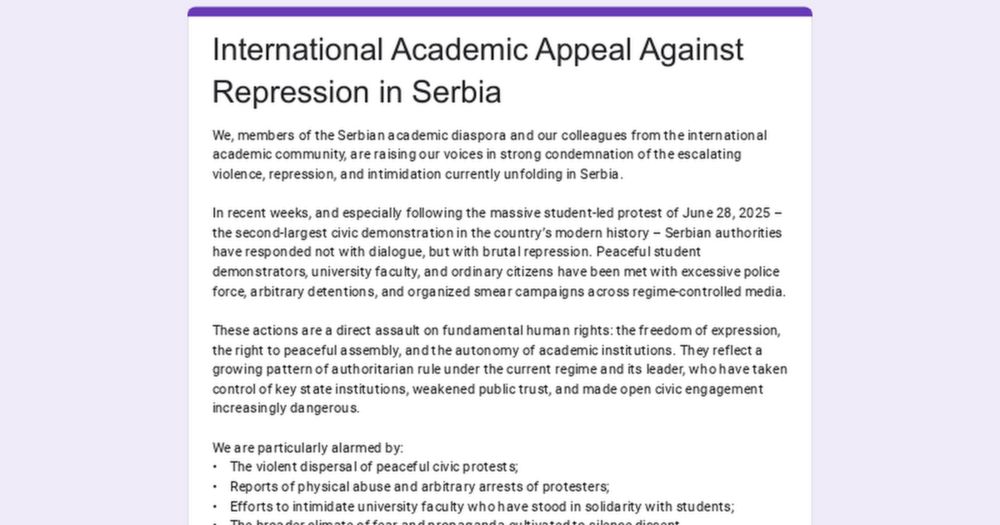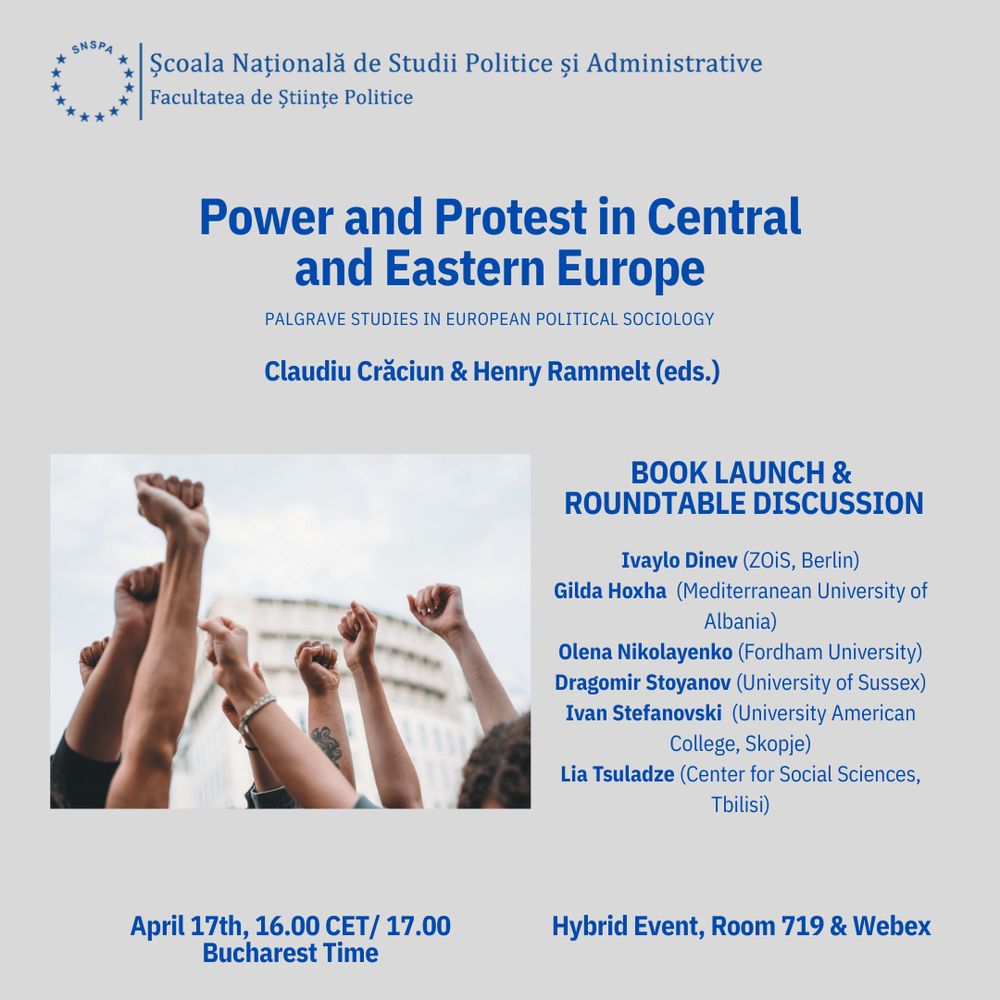
When Protest Becomes a Mode of Politics
ZOiS Spotlight 17/2025 by Ivaylo Dinev
Democracy without protests? In parts of Europe, that’s unimaginable. Protest is not an isolated episode – it has shaped the political order for almost four decades through recurring cycles of crisis, mobilization, and renewal.
I call it protest democracy.
Read it here in @zois.bsky.social Spotlight👇
24.09.2025 09:52 — 👍 5 🔁 4 💬 0 📌 0

Labour unrest in the context of multiple crises: a comparative perspective of Europe
By presenting the first comparative data of trade union and workers’ protests since Covid-19, based on local sources, this article attempts to fill a significant gap in the empirical research on cr...
Our new article is out in Social Movement Studies!
We compare workers’ protests in Belgium, Bulgaria, Greece, Italy & Romania – from protest tactics to building alliances after Covid-19. It presents the first comparative data of workers’ protests since Covid-19, based on local sources.
23.09.2025 10:48 — 👍 6 🔁 3 💬 0 📌 0

Протест, морал и приятелство: Наследството на ”Ранобудните”
В рубриката "Разговорът" в ефира на БНР двама от лидерите на студентската окупация от 2013 г. – Ивайло Динев и Лазар Петков...
In 2013, we rose against the oligarchic model in Bulgaria and demanded morality in politics — what dreamers we were! For months we occupied universities and filled the streets. The Balkans carry a long tradition of student movements. An interview for the Bulgarian National Radio.
19.08.2025 10:48 — 👍 3 🔁 0 💬 0 📌 0

Bulgarians Ride New Protest Wave, But Question Potential Impact
Bulgarians are again on the streets demanding change – but whether this popular anti-establishment movement will succeed where earlier ones failed is an open question.
The protests against the way the judicial system is being weaponised are a part of a new protest cycle – but won’t be the peak of it,” predicted Ivaylo Dinev, a researcher at the Centre for East European and International Studies in Berlin.
19.08.2025 08:32 — 👍 1 🔁 0 💬 0 📌 0

Ивайло Динев: Протестите се повтарят, защото не се направи преосноваване на демокрацията
"България преповтаря един и същи цикъл. Намираме се в кръг, от който няма изход – политическа криза, протести, леко...
Gave an interview to Bulgarian National Radio on the ongoing anti-corruption protests and the previous in 2013 and 2020.
In summary: Bulgaria is stuck in a repeating cycle—political crisis, protests, new formations, new crisis, more protests. This has continued since the transition.
23.07.2025 10:27 — 👍 4 🔁 2 💬 0 📌 0

International Academic Appeal Against Repression in Serbia
We, members of the Serbian academic diaspora and our colleagues from the international academic community, are raising our voices in strong condemnation of the escalating violence, repression, and int...
Students and citizens in #Serbia are being arrested, beaten, and declared enemies of the state for opposing Vučić's authoritarian regime.
Academic colleagues anywhere in the world, please sign this petition in solidarity with them & spread the message.
04.07.2025 07:56 — 👍 45 🔁 36 💬 0 📌 2
New publication in the DataLab Blog by Guenola Inizan!
03.07.2025 07:49 — 👍 2 🔁 0 💬 1 📌 0
Our new publication by Gaëlle Le Pavic (Ghent University and United Nations University – CRIS).
10.06.2025 12:35 — 👍 2 🔁 0 💬 0 📌 0
My analysis of the presidential election in Romania:
Simion's high results in the first round are a signal for further restructuring of the political landscape across the region. The multiple crisis creates an opportunity for anti-establishment parties.
16.05.2025 13:15 — 👍 1 🔁 0 💬 0 📌 0

Visibility, Access, Power: Why research data infrastructure matters
With Felix Herrmann, Ivaylo Dinev and Kerstin Bischl
How many people protested?
It's not just a matter of numbers—it’s a question of legitimacy and power.
🎙️ New episode of Roundtable Osteuropa with Kerstin Bischl, Felix Herrmann (DiscussData), and me — on the goals, opportunities, and challenges of researching Eastern Europe and Central Asia.
15.05.2025 08:58 — 👍 0 🔁 0 💬 0 📌 0

Group photo from KoDaNetOst, 17 people looking at the camera.

Photo from KoDaNetOst kickoff workshop at the ZOiS library, ZOiS researcher Sabine von Löwis is standing on the stage with a microphone, holding a powerpoint presentation, the photo is taken from the perspective of the audience, some audience members are in the image, listening to the presentation.
#KoDaNetOst, a new project by @centremarcbloch.bsky.social, @ecmiflensburg.bsky.social & ZOiS, was launched with a workshop & website.
Its aims: making #data for social sciences & humanities accessible & discussing means for sustainable collaboration with partners in Eastern Europe: bit.ly/4liXXor
07.04.2025 09:27 — 👍 6 🔁 3 💬 0 📌 1

Link for registration: docs.google.com/forms/d/e/1F...
15.04.2025 13:37 — 👍 0 🔁 0 💬 0 📌 0

DataLab BLOG: Constructing ‘the People’: Strategies, Modes, Scales
What does it mean when a political actor refers to ‘the people’? Where do we locate him or her in a political discourse? Bojidar Kolov presents a model that could help answer these questions and much ...
📢 New publication!
Constructing ‘the people’ often signals a political stance. Bojidar Kolov examines how this reference carries different political implications—illustrated through the migration debate in Europe and the political theology of the Russian Orthodox Church.
01.04.2025 10:11 — 👍 0 🔁 0 💬 0 📌 0

Reminder for the #CfA for our very first #DiscussDataLab on „Challenges of Data Collection, Re-use, and Analysis: Public Opinion, Political Debates, and Protests in the Context of the Russo-Ukrainian War“ that will take place in Bremen from 25-27.08.2025.
Info & application: discuss-data.net#datalab
21.03.2025 08:33 — 👍 2 🔁 1 💬 0 📌 1
As a Bulgarian who studied Albanian history, I found Free truly impressive. It offers a much-needed, nuanced perspective on our shared past in the former communist countries. I’m looking forward to the Bulgarian edition!
21.03.2025 14:09 — 👍 3 🔁 0 💬 0 📌 0
The Largest Protest in Serbia’s History. – Views from Central Europe and the Balkans
I'm glad to contribute to this new blog, which aims to explore Eastern and Central Europe, as well as the Balkans, from a scientific perspective. My first essay focuses on the recent developments in Serbia.
views-from-central-and-balkan-countries.eu/the-largest-...
21.03.2025 13:53 — 👍 2 🔁 0 💬 0 📌 0

Serbia’s Protests as a Cultural Explosion: Symbols, Memory, and the Struggle for Meaning
by Katarina Damčević The protests in Serbia are not only political demonstrations; they are also fueling a ‘cultural explosion’. Symbols of protest, such as ‘Pumpaj!’ and ‘Ćaci’, have evolved from bei...
Protests in #Serbia are more than political demonstrations; they fuel a ‘cultural explosion’. Symbols like #Pumpaj and #Ćaci have evolved from peripheral phenomena to central political symbols, shaping collective memory & the political landscape, @katarina-damcevic.bsky.social writes on our blog. ⬇️
21.03.2025 11:47 — 👍 12 🔁 11 💬 1 📌 0
Sure, but systemic change requires political power. We believed we could change the country through ideas and leading by example, driven by strong anti-party sentiments. Twelve years later, Bulgaria remains in political deadlock.
19.03.2025 11:19 — 👍 2 🔁 0 💬 1 📌 0
When I was a student and we occupied universities in Bulgaria, we said the same—we weren’t offering an alternative political party, but an alternative way of life. Yet, years after that, another movement emerged, and soon, there will be another. The cycle continues, and dissatisfaction remains.
19.03.2025 11:09 — 👍 2 🔁 0 💬 2 📌 0

Catalog of Conflict and Cooperation Datasets - KonKoop
📢 New public research resource!
Looking for data on conflict & cooperation in Eastern Europe, Central Asia, and the South Caucasus? I compile key datasets and platforms on armed conflicts, public opinion, elections and more.
Explore now: konkoop.de/index.php/da...
13.03.2025 10:39 — 👍 0 🔁 0 💬 0 📌 0

New book out! "Handbook of Progressive Politics", ed. by Alice Mattoni.
What does progressive politics look like across Central & Eastern Europe? In our chapter with Julia Rone, we explore the Baltic states, the Visegrád Group, the Western Balkans, Bulgaria and Romania.
doi.org/10.4337/9781...
10.03.2025 12:20 — 👍 5 🔁 2 💬 0 📌 1

The new book "Power and Protest in Central and Eastern Europe" takes a post-transition view on protest movements.
With 11 case—incl. our chapter on Bulgaria—it covers Albania, Belarus, Czechia, Georgia, Hungary, N. Macedonia, Poland, Romania, Russia & Ukraine.
doi.org/10.1007/978-3-031-77888-9
04.03.2025 14:21 — 👍 3 🔁 1 💬 0 📌 0
Very interesting topic! In Bulgaria, the last major anti-corruption protests coincided with Covid-19, yet authorities didn’t use restrictions to suppress them. Instead, ruling parties even staged their own protest. Perhaps its depending of what majority views about Covid-19.
04.03.2025 08:52 — 👍 1 🔁 0 💬 1 📌 0
Foreign Policy Research and Projects | Covering E. Europe, Balkans, Turkey, Caucasus, Central Asia & MENA | Academic Council | 🇪🇺-funded | media@encouncil.org | http://www.encouncil.org/
historian of modern europe global / citizenship, colonies, militarism / postdoc in the ERC project COLVET @maynoothuniversity.ie / former fellow @italianacademy.bsky.social / PhD Freie Universität Berlin
BG is an independent online journal – since 1999 – Social Struggles, Prefigurative Politics, and the Common(s) – DE/EN – Annual Project 2025 #PluriverseOfPeace – Previous: https://berlinergazette.de/projects/kin-city/
Doctoral researcher on demographic discourses in Albania and Southeastern Europe. @leibniz-ios.de 🇦🇱🇨🇦in🇩🇪🇪🇺
ReDICo: Researching Digital Interculturality Co-operatively. redico.eu
An interdisciplinary project exploring intercultural practices and discourses within digital spaces and beyond.
Join our research hub: hub.redico.eu
Professor of Conflict Studies.
Conflicts over land, food, and rural development. Social movements, internationalism.
Social Movement Studies is the leading international academic journal of social movements. RT ≠ endorsement. We tweet about movements and research on movements.
Follow our publications: https://www.tandfonline.com/toc/csms20/current
Writer, journalist, sometimes other things. www.joannaelmy.com
Docent in Nordic history, university lecturer in history and social studies (University of Oulu). Draws comics. Interests: History education, 1910s/1920s politics & culture, Tatars, Avars, Late Antiquity-Early Middle Ages.
Suomi/Svenska/English/Deutsch
5th year PhD Candidate @ Cornell working on civil society + democracy, by way of Harvard Davis Center and UNC-Chapel Hill
https://www.francescayton.com
I also help coordinate https://eepg-workshop.github.io/
5calls.org
Political scientist @FU Berlin and @WZB.bsky.social | PI ERC research group LOOPS | Studying autocracies through protest, legal norms, and elite conflict | fruhstorfer.me
Trainee in research communication #Wisskomm at @zois.bsky.social
doctoral researcher @ZOiS | MoveMeRu (ERC) | media analysis, political communication, collective memory, Russians abroad
https://linktr.ee/movemeru
Geographer, PhD @Université Lyon 2
I write on Kosovo + Balkans; run women’s rugby league Revolution Rugby in KS. https://linktr.ee/bronwynjones1
Academic and analyst | Former LSE and RUSI | Conflict and Security | Cyprus and SE Europe |
Secession and State Creation (OUP, 2023)
http://www.YouTube.com/JamesKerLindsay
Travel writer, journalist, author of award-winning My Family and Other Enemies: Life and Travels in Croatia's Hinterland. Words in Guardian, Times, Telegraph, Independent, i, CNN Travel, etc.
Agent: https://cullandco.com/
https://linktr.ee/marynovakovich
Head of Analysis at VE Insight (formerly ViennEast). Interested in Austria & CEE. Austro-Essexian hybrid. Opinions expressed are my own.





















